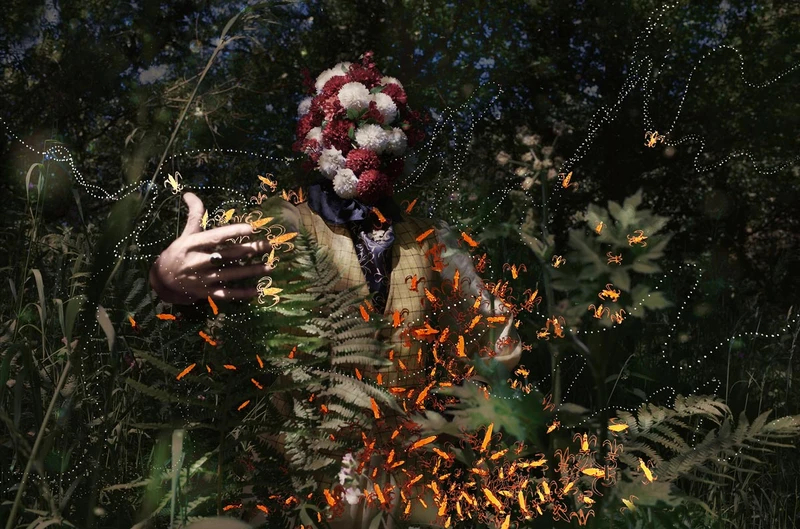Mónica Alcázar-Duarte: Digital Clouds Don’t Carry Rain
16 Feb-1 Jun 2024


Affirming the value and survival of her ancestors’ indigenous knowledge, Mexican-British artist Mónica Alcázar-Duarte examines western society’s obsession with speed, expansion and resource accumulation at a time when ecological disaster looms. She raises critical questions – where does knowledge lie? Who and what is classified? – joining together the threads of dissociated knowledge systems.
The evocative photographs at the core of Digital Clouds Don’t Carry Rain are set amongst the dying trees of Derbyshire, home of the Industrial Revolution. In these self-portraits, the artist mimics poses from 18th-century Casta paintings, a genre of art that was used in Spain to illustrate colonial, racist social hierarchies – classifying mixed race individuals within a ‘caste’ system.
Attempting to make complex power structures visible, Alcázar-Duarte intervenes in her photographs. Masks covered in flowers reference both the emblems of empire and plants that are vitally important to endangered bees in the Yucatán. Copper appears throughout the works, a material extracted from Mexico under Spanish colonial rule which today continues to be used in cables as a carrier for the internet globally. Patterning formed by datasets scanned from the faces of the Casta paintings are juxtaposed against the fleur-de-lis: a symbol of the lily connoting monarchy and virtue, which was also used during the colonial era to mark enslaved people as a punishment.
These photographs appear alongside a short film U K'ux Kaj / Heart of sky, Mayan god of storms (2023-24), produced at Maní in the Yucatán Peninsula, the town where the Mayan codices were burned in 1562. Rooted in the centre of the exhibition is a new installation T'aabal chukChuuk / Embers (2024). Using an algorithm inspired by the collective intelligence of bee colonies, Alcázar-Duarte merges the fleur-de-lis with fragments from the Casta paintings. The resulting fifty-six 3D printed lilies form a garden of technology based in historical classification systems, activated through augmented reality.
The artist reflects: “I find myself wondering if there could be different approaches to tackling the important questions of our time…how is it that the knowledge of my ancestors has been completely disassociated from contemporary knowledge systems?”